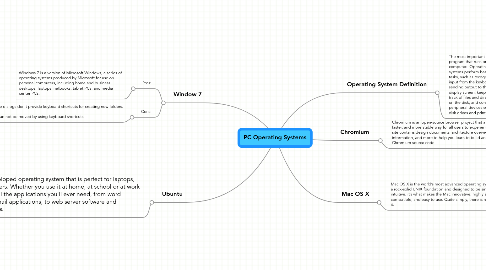PC Operating Systems
von Kenya Morales

1. Window 7
1.1. Pros:
1.1.1. Windows 7 is a version of Microsoft Windows, a series of operating systems produced by Microsoft for use on personal computers, including home and business desktops, laptops, netbooks, tablet PCs, and media center PCs.
1.2. Cons:
1.2.1. File Open/Save dialogs don't provide keyboard shortcuts for creating new folders. . The Split bar can not be moved by using keyboard shortcuts.
2. Ubuntu
2.1. A community developed operating system that is perfect for laptops, desktops and servers. Whether you use it at home, at school or at work Ubuntu contains all the applications you'll ever need, from word processing and email applications, to web server software and programming tools.
3. Operating System Definition
3.1. The most important program that runs on a computer. Operating systems perform basic tasks, such as recognizing input from the keyboard, sending output to the display screen, keeping track of files and directories on the disk, and controlling peripheral devices such as disk drives and printers.
4. Mac OS X
4.1. Mac OS X is the world’s most advanced operating system. Built on a rock-solid UNIX foundation and designed to be simple and intuitive, it’s what makes the Mac innovative, highly secure, compatible, and easy to use. Quite simply, there is nothing else like it.
5. Chromium
5.1. Chromium is an open-source browser project that aims to build a safer, faster, and more stable way for all users to experience the web. This site contains design documents, architecture overviews, testing information, and more to help you learn to build and work with the Chromium source code.


